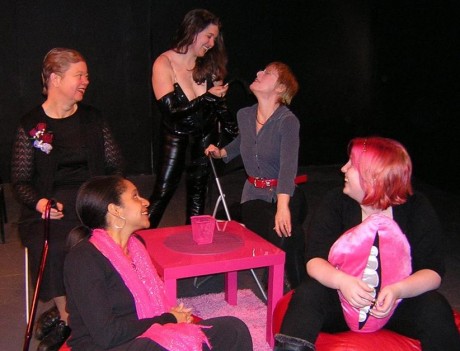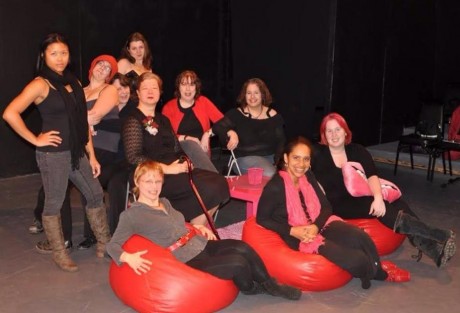What would your vagina say if it could talk? Mine would say that you need to go see the Rude Mechanicals and their production of Eve Ensler’s The Vagina Monologues at the Greenbelt Art Center. Co-Directed by Lauren Beward and Jaki Demarest, this particular production of the iconic feminist piece is defying the standards of which the original was formed with and setting the benchmark extremely high for all future productions. With an inventive new approach to the nearly 20 year-old performance piece, Demarest and Beward set out to incorporate an ensemble feel to the production beyond just involving women from a myriad of social backgrounds. Exceptionally well delivered, this production transcends the gender boundaries of its nature and inspires dialogue between audience members, even among the men that attend; a remarkable feat for a play that often gets lumped into stereotypical category of ‘just for women.’

Bringing together 10 women of varying backgrounds; straight and lesbian, Jewish and Christian, young and old, Black, White, and Asian; is no easy task. Directors Jaki Demarest and Lauren Beward succeed in rounding up a group of delightfully talented women that drive a new understanding into this well-recognized work. Demarest and Beward think outside of the box—a signature trademark of the company’s productions—and bring an ensemble approach to the production. By creating a ‘lady lounge’ of sorts on the stage through the use of red bean bag chairs, upright chairs, and pillows and carpet spaces, the directing duo invites the cast to gather around casually and become an active part of each monologue as it is presented. There is something not only unifying but sacred and trustworthy in this atmospheric creation; the actors are no longer individual woman delivering monologues to a group but are part of something bigger; a collective of women sharing stories, which was exactly how playwright Eve Ensler had envisioned the project when it began.
The actors respond with little laughs or comments to certain parts of the funnier monologues, and hang on the edge of their seats for the more intensely delivered ones; not only becoming a part of the story and making it their own but creating a receptive and reflective atmosphere that allows the audience to open up with their responses to the pieces more freely. Seeing a group of women react to certain words or aspects of the stories being told infuses the theatre with a sense of openness and acceptance, making the audience more susceptible to let loose with their responses and feelings. Demarest and Beward take their creative designs one step further and create a clothing rack across the back of the stage filled with an assortment of red and pink garments, one of which is donned by every woman before she delivers her monologue. This creates an ease of transition for the actor, stepping into the character they are about to craft with the subtle addition of a corsage, a scarf, or jacket. These unique and bold choices cultivated by Demarest and Beward take the production to the next level of excellence; because The Vagina Monologueshave been done before, but this interpretation makes them speak to a larger group of people simply in the open and expressive setting they create, and the dialogue that is inspired because of that openness.
Mikki Barry opens up the monologues with her performance of Hair. Barry brings a very grounded and down to earth presence with this monologue about the taboo subject of hair down there, letting little bits of humor infuse her voice at the exact appropriate moment while still finding the liberating freedom in the story’s overall message, and expressing that those listening with a natural essence of femininity that is both subtle and beautiful.
Carol V. Calhoun crafts an exceptionally brilliant rendition of The Flood. Playing the older woman character, Calhoun brings a raw relatability to this woman’s story; a genuine sense of nervous emotional vulnerability that translates across age and gender gaps, making this tale touch your heartstrings. Her ability to articulate every emotion with that hint of being flustered over the subject matter is both poignant and at times humorous; a wonderful moment to showcase that all women, regardless of age, share these things in common.
Then comes the second best comic monologue in the piece, The Vagina Workshop, delivered by Sam David. There is something deeply satisfying about watching this particular monologue being delivered with an authentic British accent as David surges forth in waves of ecstatic pleasure, balanced out with the crash of mortifying nervousness; the epitome of a reserved and slightly prudish British woman discovering self-pleasure in sexuality. The most stunning thing about David’s delivery is the physical exertion she puts her character through, enabling the audience to see a manifestation of her struggle, bringing us along for the rollercoaster of laughs and heartfelt moments.
Lisa Hill-Corley delivers Because He Liked to Look At It with an almost blasé approach to the monologue. There is something innately casual about this performance but it makes it catching and intriguing because it is different from the first three performed. Her delivery is strong with poignantly punctuated moments of flavor that truly showcase what it is like to take pride and ownership in one’s vagina as a beautiful entity.
The most difficult monologue in the series, entitled My Vagina Was My Village is delivered in stunning perfection by the sensationalRachel Duda. A haunting and harrowing tale that requires emotional precision is presented with due justice from Duda, every eye on her every word as she tells this heart wrenching brutal tale of rape. Making a bold and very risky decision to adapt an accent in this piece, Duda incorporates it into the monologue flawlessly, making it even more of a reality as the piece unfolds. The pain and suffering of how such a delicate and beautiful thing has reached total unforgiveable annihilative destruction radiates from every fiber in her being; Duda’s finest performance, and the production’s heaviest and best delivered monologue.
Quickly getting the audience back to laughter is Cori Dioquino withMy Angry Vagina. Dioquino is fury incarnate with this rampaging energy that comes bulleting out of her mouth and body as she storms back and forth across the stage. Dioquino takes the words on the warpath, expressing without reserve the sheer rage that is pulsing from her vagina. Zapping the audience with a bitter bite, a hilarious dose of condescension, and a possessed fury that grows exponentially until it erupts into a crazy verbally violent climax, Dioquino finds a cathartic brilliance in this piece; something to which all women can relate.
Spencer Kate takes on a challenging monologue with her portrayal of The Little Coochi Snorcher That Could. Kate manifests her character’s rapid change of ages through simple physical gestures. Growing from age three to age nine involves a simple shift in her posture and the way in which she reigns in her body’s energy more and more as she grows. Her southern accent fades as her character grows older, as does her bold vocal expressions; symbolically reflecting the way her youth and innocence have been slowly stripped away.
Reclaiming Cunt is Kate Smith-Morse’s monologue that presents the audience with a streetwise attitude and a gruff exterior. It is delivered sounding like beat poetry that is jumping out from somewhere deep within her feminine soul; a woman on a mission and by the time she’s finished with the brief piece, ‘cunt’ doesn’t even sound like a word anymore. The bonus to Smith-Morse’s monologue is getting to do one of the question segments as a six-year-old girl, just as moody, albeit toned down, as her main character in this monologue.
Co-Director Lauren Beward tackles the most comically challenging monologue in the play: The Woman who Loved to Make Vaginas Happy. From the moment she struts up to the stairs to begin her piece Beward is exuding a dominatrix persona that is both sassy and sexual. She delivers the meat of this text in a seductive and enticing fashion, But her climactic moment comes when Beward delivers 20 different types of orgasmic moans in rapid succession, resulting in an aesthetic climax so intense that the entire group of actors has to have a collective smoke to calm themselves down. Beward has confidence radiating from her vagina and she’s not afraid to use it in this monologue.

The Vagina Monologues at Greenbelt Art Center is a smash for men and women alike. There’s plenty to relate to, and plenty to talk about. And this bold new approach really brings a great deal of ensemble significance to the performance. It’s a great reason to see The Vagina Monologues again or for the first time.
Running Time: Approximately one hour and 40 minutes, with no intermission.
The Vagina Monologues plays through February 8, 2014 with The Rude Mechanicals at The Greenbelt Arts Center—123 Centerway in Greenbelt, MD. For tickets, call the box office at (301) 441-8770, or purchase them online.

